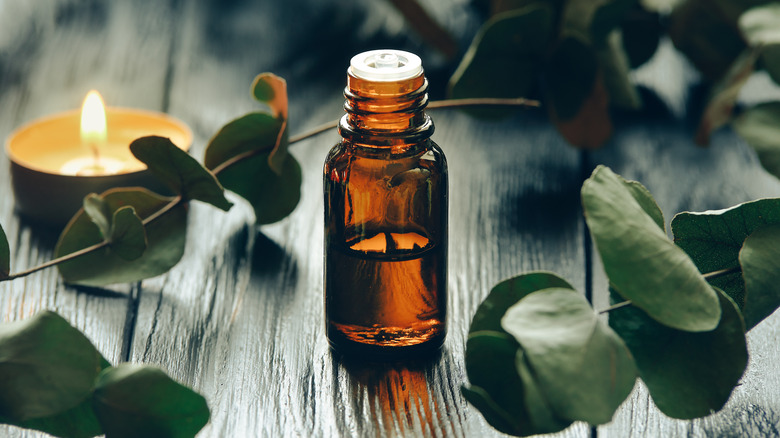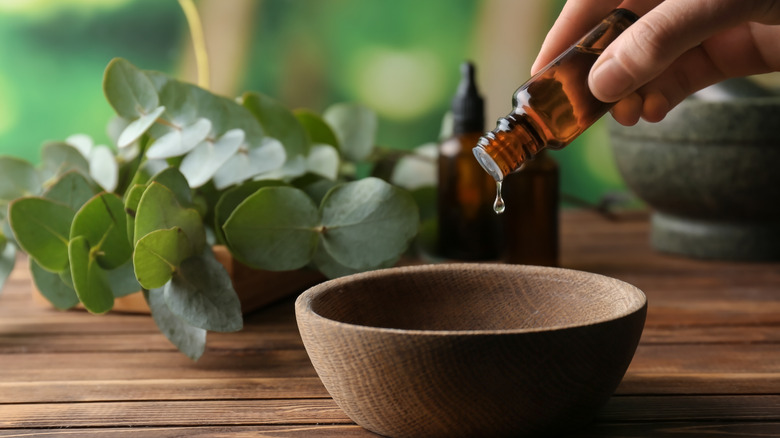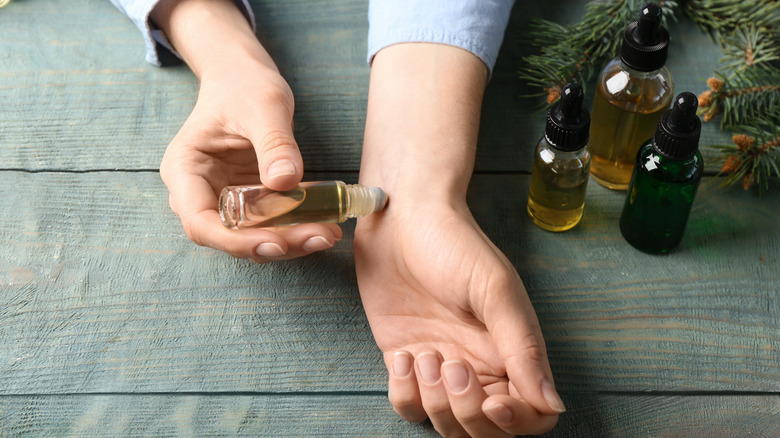What You Need To Know Before Using Eucalyptus Oil For Skincare
Beauty bloggers often recommend using eucalyptus oil for skincare, saying that it promotes healing and relieves sunburn. What they forget to mention is that essential oils, including those containing eucalyptus, should be diluted before applying them to the skin. But even the diluted form may pose health risks, warns the U.S. National Library of Medicine.
Like other essential oils, eucalyptus oil boasts antimicrobial effects. In clinical trials, it has been proven effective against certain viruses and bacteria, notes a 2020 research paper featured in Alternative Medicine Review. The same source reports that eucalyptus oil exhibits antifungal, anti-inflammatory, and analgesic properties. These effects may be due to its high content of phytochemicals and volatile oils, such as pinene and limonene, suggests a 2015 review published in the Asian Pacific Journal of Tropical Biomedicine (via ScienceDirect).
This brings up the question: Should you be using eucalyptus oil for skincare? And is it safe? The answer depends on who you ask. The experts at Winchester Hospital say that applying eucalyptus oil to the skin is likely safe. Just make sure you dilute it with a carrier oil, such as avocado, coconut, or olive oil. The U.S. National Library of Medicine, on the other hand, states that there's not enough evidence to confirm its safety.
What are the benefits of using eucalyptus oil for skincare?
Eucalyptus oil is traditionally used as a natural remedy for asthma, gum disease, toenail fungus, acne, ulcers, and other conditions. Some people say that it speeds up wound healing, eliminates bad breath, and relieves nasal congestion, but these claims lack scientific evidence (via MedlinePlus). However, scientists agree that eucalyptus oil may inhibit microbial growth while reducing pain and inflammation.
Clinical research published in the Asian Pacific Journal of Tropical Biomedicine (via ScienceDirect) suggests that cineole, pinene, and other phytochemicals in eucalyptus oil exhibit therapeutic action. As the scientists note, these compounds may help with the treatment of herpes, wounds, burns, and insect bites when applied topically. In one study, eucalyptus oil improved the symptoms of fungal toenail infections (via the Journal of Foot and Ankle Research & NCBI).
These findings show that eucalyptus oil may benefit those with certain skin problems. But even so, you should use it with caution. Undiluted eucalyptus oil might not be safe for people with damaged or inflamed skin, warns the National Association for Holistic Aromatherapy. The same goes for those with certain skin diseases or allergies, as essential oils may worsen their symptoms and cause irritation.
How to apply eucalyptus oil to your skin
Most essential oils, including eucalyptus oil, can be inhaled or applied topically. Some are safe for ingestion, too. Depending on your needs, you may apply eucalyptus oil directly on the skin or pour a few drops into your bathwater. Another option is to use compresses with eucalyptus oil. Again, make sure you first dilute it with a carrier oil or water.
The American College of Healthcare Sciences (ACHS) recommends a 2% dilution for topical usage, meaning that you need to add about four tablespoons or 24 drops of essential oil to every two ounces of carrier oil. If you have one ounce of carrier oil, you'll add 12 drops (two tablespoons) of eucalyptus oil. Use a 4% solution for concentrated massage oil.
Before getting started, wash your forearm with unscented soap and then apply a few drops of diluted eucalyptus oil. Cover the area with sterile gauze and wait 24 hours, suggests the ACHS. If there are no signs of irritation, burning, or allergic reactions, you can go ahead and apply the diluted oil as needed.
Note that using eucalyptus oil for skincare or other purposes during pregnancy may not be safe, warns the U.S. National Library of Medicine (via MedlinePlus). Experts also advise against using eucalyptus oil on children, as it may affect their nervous system.


